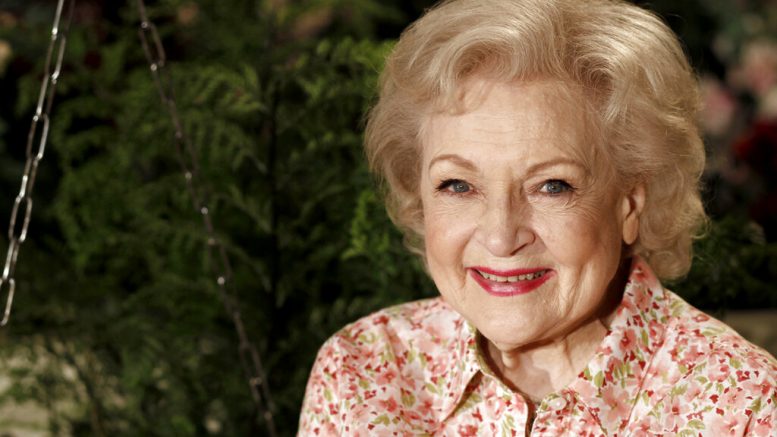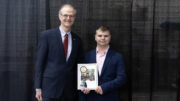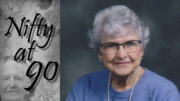LOS ANGELES (AP) — A photo of Betty White, with dimpled smile and guileless gaze, fills the cover of a coffee table book arriving the month before her 100th birthday.
The image evokes the genuine White, according to the book’s author, Ray Richmond. After digging into her life and career, he concluded that she’s as warm and appealing as appearances would have it.
But her willingness to play against type, whether as scheming Sue Ann on “The Mary Tyler Moore Show” or naïve Rose of “The Golden Girls,” proves how game and talented White is, said Richmond.
That, coupled with an impressive work ethic, carried her from a cameo on television in its 1930s infancy to the darling of “Saturday Night Live” in the 21st century, with a myriad of show business gigs along the way.
“You could make a convincing case that Betty White is the most versatile and beloved entertainer in American history,” said Richmond, whose “Betty White: 100 Remarkable Moments in an Extraordinary Life” (becker&mayer! Books) is out Tuesday.
Besides starring in sitcoms and making guest appearances in dozens of others, she was a reliably witty game show host and guest; parade emcee (California’s Rose Parade and New York’s Thanksgiving Day parade) and soap opera actor (“The Bold and the Beautiful”). She dabbled in drama on the big screen (including as a U.S. senator in 1962’s “Advise & Consent”) and on TV (“Bones,” “Boston Legal”).
Hosting “Saturday Night Live” in 2010 — at age 88 — earned her a fifth Emmy Award and a new generation of admirers.
White, who will reach centenarian status on Jan. 17, 2022, didn’t participate in the book. Richmond, a veteran entertainment reporter and critic, instead relied on research and interviews with her friends and colleagues, including Carol Burnett, Candice Bergen and Gavin MacLeod (Murray on “The Mary Tyler Moore Show”).
MacLeod, who died last May at age 90, wrote the book’s forward. Saluting White as a great performer and “national treasure,” he deemed her “one of the most caring and loving human beings I’ve ever known.”
She’s also a pro, said Bill D’Elia, producer with David E. Kelley of “Boston Legal.” Kelley, who had worked with White on his film “Lake Placid,” delighted in giving her salty language and bad behavior to play, D’Elia says in the book.
“David loved the contrast of her image versus what the character was saying,” he said. “She would happily say anything and do anything the story and script called for.”
The book briefly sketches the Illinois native’s early years before moving to a breezily detailed account of White’s success in Hollywood. The great loves of her life — husband Allen Ludden, who was a game show host, and animals of all breeds — also get attention. Among the book’s photos is one of the couple on the day of their Las Vegas wedding in 1963 (Ludden died in 1981).
There are also studio and publicity shots of White alone and with her co-stars. One was taken the night she, Bea Arthur, Rue McClanahan and Estelle Getty re-enacted scenes from “The Golden Girls” at a royal variety show in London attended by Britain’s Queen Mother, who is said to have requested their performance.
Among the moments and milestones recounted in “Betty White: 100 Remarkable Moments in an Extraordinary Life”:
— After singing at her 1939 high school graduation, White and another student were asked to join an experimental TV test in Los Angeles. As the pair danced and sang on the sixth floor of a building owned by auto dealer and broadcast pioneer Earle C. Anthony, the performance was transmitted to the lobby. The audience: the teens’ parents and a few others.
— When the United States entered World War II in December 1941, White, then just shy of 20, joined a women’s volunteer organization that provided home-front support. She drove trucks carrying supplies for soldiers housed at Los Angeles-area camps during the day; at night, she joined dances for troops set to be deployed overseas.
— “The Betty White Show,” with White hosting a half-hour of songs and interviews, debuted in 1954 on NBC. It included 21-year-old Black tap dancer Arthur Duncan at a time when people of color were rarely seen on TV. Station managers citing viewer complaints threatened to pull the show. A defiant White began booking Duncan more frequently, with the network’s backing. Duncan, who became a longtime regular on “The Lawrence Welk Show” starting in the 1960s and is now 88, is quoted in the book saluting White for defending him and “opening a lot of doors for me in performing.”
— White moved in glamorous circles, and created them. Burnett recalls joining “game nights” at the White-Ludden house. Charades, board games and such were the entertainment, and “they would have people there like Fred Astaire just hanging around. And Burt Reynolds. My gosh, there were just so many,” Burnett said.


































